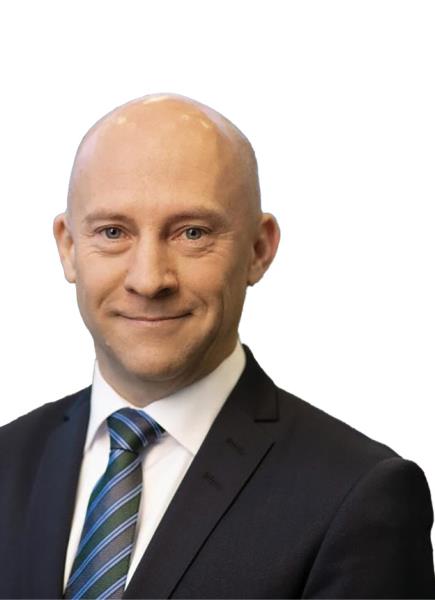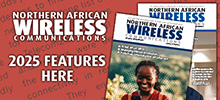04 November 2024

Patrick Johansson, President of Ericsson
Middle East and Africa
Amidst rapid digital transformation across the continent, Ericsson continues to forge its path–enabling communications, upskilling a generation, and supporting rampant network expansion. Amy Saunders spoke with Patrick Johansson, President of Ericsson Middle East and Africa, to garner his views from this new role - examining everything from the continued rollout of 5G through to the challenges of the skills divide.
5G remains in its infancy across the continent; how do you see it developing, and how is Ericsson acting to advance its rollout?
Ericsson has been connecting Africa for over 100 years and has built wireless networks for every generation – from the early 1G networks to the first advanced 5G networks. 5G technology is still in its early stages across Africa, but its development is rapidly gaining momentum. We anticipate a transformative impact on the continent as 5G adoption accelerates, particularly with the projected increase in 5G subscriptions across sub-Saharan Africa. This increase will constitute 28% of the region’s mobile subscribers by 2029, signaling significant progress.
We are committed to advancing the rollout of 5G in Africa through several key initiatives. Our Ericsson Spectrum Sharing (ESS) solution allows CSPs to repurpose their existing 4G spectrum for 5G, which streamlines the deployment process and enables faster, more efficient rollouts. We are also collaborating with service providers to modernize infrastructure, ensuring they are equipped to meet the growing demand for high-speed, reliable connectivity.
Moreover, Ericsson is focused on developing intelligent energy-saving technologies like our Radio Access Network (RAN) energy-saving software, which optimizes network performance while significantly reducing energy consumption. This is critical for addressing challenges related to power supply, particularly in rural areas. Through efficient monitoring and AI-supported tracking, we have identified areas for optimization, which can result in up to 12% annual reduction in RAN energy use. This is critical for addressing challenges related to power supply, particularly in rural areas.
Furthermore, Fixed Wireless Access (FWA) has emerged as a pivotal tool for addressing Africa’s broadband needs. While 4G FWA provides an initial steppingstone, the potential of 5G becomes evident through its ability to deliver fiber-like speeds, complementing the fixed broadband in a country. Remarkably, several African markets, including Angola, South Africa, Nigeria, and Zimbabwe, have already started to offer 5G FWA services. This pivot towards FWA can be attributed to its cost-effectiveness, rapid deployment capabilities, and inherent flexibility, making it an enticing choice over traditional fixed services.
In addition to improving infrastructure, we work closely with governments, CSPs, and industry stakeholders to foster collaborations and public-private partnerships that support investment in 5G technology.
Earlier this year, we completed the first 5G trial in Egypt in partnership with Telecom Egypt, covering key spots in the country’s New Administrative Capital. Furthermore, we collaborated with Vodafone Egypt to modernize and expand the capacity of its mobile network by introducing Ericsson’s triple-band radio 4466 which reduces tower load, shortens deployment time, and supports sustainability efforts through lower energy consumption. We also supported Moov Africa Bénin in handling the data flow for around 45,000 attendees at the WeLovEya music festival in the city of Cotonou in Benin and many more partnerships that highlights the acceleration of 5G deployment across the continent.
How are Africa’s telcos responding to growing sustainability pressures?
African telcos are increasingly responding to growing sustainability requirements driven by the global shift towards environmentally friendly business practices and rising regulatory expectations. Ericsson is responding to these challenges with a comprehensive sustainability strategy deeply embedded in our operations and across our partnerships with our customers in Africa.
Ericsson’s sustainability efforts in Africa focus on reducing carbon emissions, energy consumption, and environmental waste while enhancing the efficiency of telecom networks. One of the key areas of focus is energy-efficient technology. Ericsson has introduced innovations like the Ericsson Radio System, which makes 5G technology 10 times more efficient than 4G, allowing operators to meet the growing demand for connectivity while consuming less energy. This is part of our Breaking the Energy Curve initiative, where we work closely with African telecom operators to deploy energy-saving solutions that reduce total network energy consumption.
At Ericsson, we believe that ICT can empower other industries to move towards the low-carbon economy. According to Ericsson research, the sector has the potential to reduce total industrial emissions worldwide by up to 15%, even though it is responsible for only 1.4% of the global carbon footprint.
For instance, the Ericsson 6626 Radio—which is deployed in over 20 African countries—can reduce power consumption by up to 50% and lighten the load on telecom towers. Another notable example is our partnership with Airtel Niger, where we deployed Ericsson’s dual-band three-sector Radio 6626 to provide a 5G-ready, energy-efficient network, reducing energy consumption by over 60% and lowering carbon emissions by 0.4 tons per site annually.
We also partnered with Vodafone Egypt for an innovative network modernization initiative. Vodafone Egypt became the first service provider globally to deploy Ericsson’s triple-band Radio 4466, which supports simultaneous 2G, 3G, 4G, and 5G operations. This breakthrough not only enhances user experience and network performance but also contributes to sustainability goals by reducing energy consumption by up to 15%.
Ericsson is also promoting the adoption of solar-powered rural site solutions to extend connectivity to remote areas in a sustainable way. In collaboration with MTN Benin, we are providing reliable mobile broadband services to rural communities using 100% solar-powered sites. These 29 rural sites run entirely on renewable solar and battery power, reducing the carbon footprint of network infrastructure and supporting telecom operators in hard-to-reach areas where traditional energy sources are unreliable or unavailable.
Beyond our focus on telecom network efficiency, we have established ambitious environmental goals. By 2040, Ericsson aims to achieve Net Zero greenhouse gas (GHG) emissions across our value chain, and have already made significant strides, including surpassing our first science-based targets aligned with the Paris Agreement. By 2030, we plan to reduce value chain emissions by 50%, working towards their broader climate goals while supporting African operators, such as MTN, in achieving similar commitments. Together with MTN, we have pledged to the Road to Zero strategy.
In addition to these technological innovations, Ericsson’s sustainability initiatives include a Product Take-Back Program, which ensures that obsolete equipment is responsibly disposed of or recycled. Over the past 10 years, Ericsson has processed over 10,000 metric tons of e-waste in Middle East & Africa, a majority of which have come from customers in over 28 countries in Africa. A key example is our collaboration with MTN Benin, where, since 2021, we have recycled more than 123 metric tons of waste electrical and electronic equipment (WEEE) through the Ericsson Product Take-Back Program. This circularity initiative helps reduce e-waste, a growing concern in the telecom industry, and further underlines our commitment to circularity in Africa.
Through Ericsson’s Africa in Motion vision, we emphasize our long-term dedication to a connected and sustainable Africa. Today, we are at the forefront of the telecom industry’s efforts to meet sustainability challenges while supporting the continent’s economic and digital growth.
With a variety of IT upskilling projects underway across the continent, how much of a problem is the skills gap, and what are your expectations for it in the next five years?
The skills gap in Africa remains an obstacle, particularly in the face of rapid digital transformation and the growing demand for advanced digital skills. While the continent has made strides in embracing technology, much of the workforce is often unprepared for the demands of Industry 4.0.
In the next five years, the skills gap will likely persist, but through concerted efforts, the gap can be narrowed. We are heavily invested in bridging this divide through advancing our digital education programs and partnerships. Initiatives like Connect To Learn, launched in 2010, and the Giga initiative in collaboration with UNICEF are designed to provide digital learning opportunities to young people across Africa. We have recently conducted together with Unicef a visit to two of the schools that benefited from the initiative together with our partner Airtel and we heard from teachers and students the effect and the impact of connecting a school. Ericsson is also a leading private sector partner in the Digital Transformation Collaborative led by UNESCO, advising governments on the digital transformation of education. To date, Connect To Learn has reached 485,000 children and young adults in 43 countries.
Adding on to Ericsson’s Connect To Learn and Giga Initiatives, through our partnership with Free Senegal and the Ministry of Education, we’ve created digital ecosystems in schools, providing connectivity, digital tools, and training for teachers and students. By implementing FWA solutions, we’re enabling fast, reliable internet access and bridging the digital divide in education.
In addition to programs targeting students, Ericsson’s Gen-E Graduate Program equips recent engineering graduates with the skills necessary to thrive in the telecom industry. In collaboration with the Smart Africa Digital Academy (SADA), we also offered upskilling opportunities for over 100 policymakers and regulators across 19 countries in Africa to ensure the development of a digitally capable workforce of the future from both the public and private sectors.
In what ways has Ericsson committed to the digital advancement of Africa, and what are the company’s biggest success stories from recent years?
Ericsson has been a committed partner in Africa’s digital transformation journey for over a century, playing a pivotal role in shaping the continent’s digital future through the deployment of advanced networks and innovative solutions. Our mission, encapsulated in the “Africa in Motion” initiative, is to empower a sustainable and connected Africa, where digitalization drives economic growth, fosters development, and creates opportunities for all.
Our team of experts possesses deep knowledge and extensive experience in every corner of Africa, coupled with remarkable talent to provide innovative solutions to meet any need.
A key area of impact is our work in expanding financial inclusion. For instance, MTN’s Mobile Money platform, powered by the Ericsson Wallet Platform, has transformed mobile financial services in Africa. As the continent’s largest mobile money service, MoMo operates in 17 markets, empowering over 69 million users. In 2022, we were honored with the Glotel Award for Mobile Financial Services Mastery in recognition of this solution, which processed over 9.5 billion transactions that year alone.
In addition to financial inclusion, our efforts extend to gender and economic inclusion as well. In collaboration with MTN Uganda, we launched a financial literacy program aimed at women entrepreneurs, training them on leveraging MoMo for business growth. This initiative, launched on International Women’s Day, emphasized both financial inclusion and gender empowerment, helping women unlock their full potential.
Another significant milestone is our collaboration with Telecom Egypt in testing 5G across key locations in Egypt’s New Administrative Capital. This trial showcased Ericsson’s 5G technology, achieving maximum throughput and demonstrating the potential of next-generation connectivity to support smart city initiatives.
Moreover, our Private 5G solution has been instrumental in transforming South Africa’s mining sector through our collaboration with Comsol. By enabling advanced use cases such as Autonomous Vehicles and Augmented Reality, this partnership is driving operational efficiencies, improving safety, and supporting sustainability goals in the industry.






